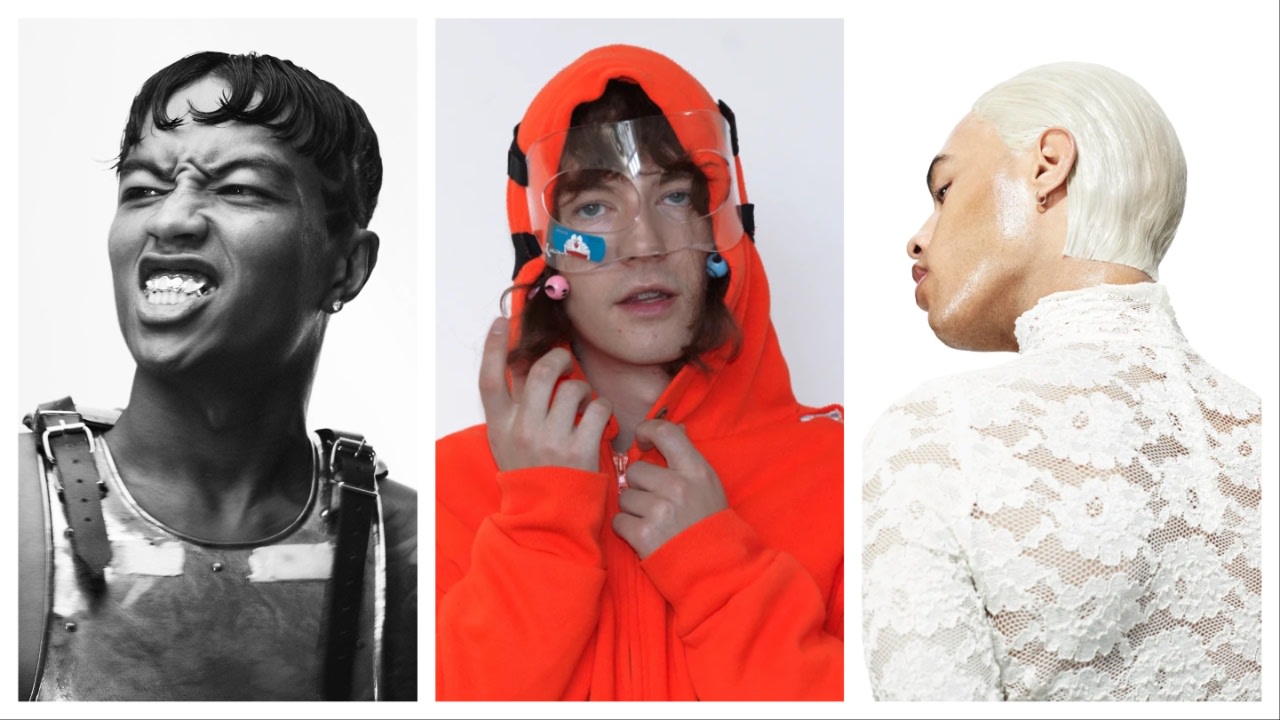 Left: Thaiboy Digital. Photo by Fredrik Andersson Andersson. Middle: Bladee. Photo by Arcin Sagdic for The FADER. Right: Ecco2k. Photo by Daniel Sannwald.
Left: Thaiboy Digital. Photo by Fredrik Andersson Andersson. Middle: Bladee. Photo by Arcin Sagdic for The FADER. Right: Ecco2k. Photo by Daniel Sannwald.
“The world is a trash island,” Stockholm enigma Bladee told Jack Angell in a rare 2019 interview with The FADER. “You have the power to create your own reality.”
Trash Island, a full-length collaboration with the other three members of Drain Gang — falsetto stylist Ecco2k, fried monotoner Thaiboy Digital, and Whitearmor, the producer whose gummy, cloudy beats and absurd work rate glue everything together — arrived five days before that interview’s publication, and five years ago today. Recorded in Thailand due to Thaiboy’s inability to return to Sweden following his deportation in 2015, it’s the last album they’ve released as a full group to date. It’s also by far the tightest, most cohesive project they’d made as a group, and the one that elevated their strange brand of positive pessimism beyond its initial, niche market.
Crucially, Trash Island marked the start of a (relatively brief) era in which Bladee — Drain Gang’s leading man up to that point — stepped back and played a more managerial role, allowing the rest of his crew to shine. This decision was as strategic as it was aesthetic: Both of his fellow Drain Gang vocalists would release excellent albums that fall, with Thaiboy’s Legendary Member dropping two weeks after Trash Island’s release, and Ecco’s e following two months after that.
Trash Island starts with “1: 1,” an archetypal DG opener that rides in on a wistful Whitearmor synth before the beat drops. Bladee is notably absent from the track, with Ecco taking the lead, Thaiboy providing a hook-like verse (mainly comprising the repeated refrain “We settling for the stars only”), and Yung Lean, the group’s earliest benefactor, adding a quick five bars of his own.
From there, we move on to a two-track run led by Thaiboy: On “30th Floor” — a subdued banger that would become one of the project’s sleeper standouts — he reasserts his talent for crafting undercover earworms with very little source material. He does so once again on “Waterfall,” almost winking at the listener with the sing-song simplicity of his chorus (”La-la-la-la-la, I pour, I pour, I pour”).
The heart of the 22-minute, eight-track album comes, appropriately, in its midsection. On track four, “Victim,” Bladee reminds us that he’s also quite good at the minimalist hook game, repeating, “I love to play the victim [3X] / I love to pass the blame,” over an understated instrumental that, like everything else DG does, burrows sneakily into one’s brain and sticks around. Then he steps aside, and Ecco takes the reins, delivering a free-flowing biblical metaphor for battling destructive urges.
After that, we get “Western Union,” which still stands half a decade later as DG’s most certifiable collaborative crossover hit. The track is built around an Ecco hook that’s nothing less than iconic: “One shot, click-click-click, reload, reload, reload / Twenty thousand THB, make a call to Nino / Western Union, six-zero-zero-zero / I go easy mode, cheat code, cheat code, cheat code.” It’s a perfect posse cut, led by one artist (Ecco in this case) while showcasing the others in short form.
The record enters its third movement with “The Void,” finding DG in the depressed, introspective bag that first drew so many troubled teenagers to the group’s self-created compost realm like lonely flies. (The other, more hyperpop-oriented members of the cult are just as rabid, but for more hedonistic reasons). It’s the first truly Bladee-led track on Trash Island and easily the darkest. “I’m aching for it,” he repeats 11 times to start the song, before landing on a slanted, sinister couplet: “One step back, two steps forward / One foot into the void.” Whitearmor does masterful work with the production here, replacing his usual soaring openness with distant synths and a faint, heartbeat kick drum that seems to echo up from a bottomless pit.
Trash Island’s final two tracks, “Acid Rain” and “You Lose,” are probably the album’s weakest, but their inclusion is by no means an afterthought. Ending on “The Void” would’ve made sense in the group’s earlier era, in which Bladee has openly admitted he used addiction, depression, and suicidal ideation aesthetically, albeit cathartically as well. Its two closing tracks, while not as impactful, contain glimpses of hope.
“Made the hotel to a place of worship,” he sings in the lighter part of his register on “Acid Rain.” “Make the music when it is submerging.”
“As long as you lose, that’s all on you / I gotta tell the truth, I break the rules,” Ecco begins on “You Lose,” getting a bit silly with it.
In his FADER interview, Bladee told Angell that he didn’t regret his early songs of suffering, but that he hoped to be more positive in the future. Tentatively moving away from the Schopenhauerian pessimism of their early work, Drain Gang — or Bladee, at least — was looking ahead from a more Platonic perspective. “[I]f you follow your essence you can take it to good things if you’re true to yourself,” he said, later adding that “[t]he only true worth is what’s inside you, man. The rest of the shit is all just trash.”
Since 2019, the members of Drain Gang have continued to be sparing with the interviews they give and personas they project on social media. And yet, the drainer cult has continued to grow exponentially. Though not exactly rosy, the more universal philosophy embraced on Trash Island helped them become the force they are today.